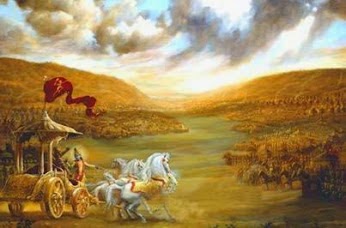Gita : Ch-2. Slo-2.
Srimad Bhagavad-Gita :
Chapter-2. ( Samkya-yogam )
Slokam-2. ( The Supreme Lord said: 'Wherefrom came this impurity of lamentation at this hour of crisis? This practice of the uncivilized that does not lead to a better world, is the cause of infamy, O Arjuna. )
Sri-Bhagavnn uvaca :
kutas tva kasmalam idam vishame samupasthitam,
anarya-justam asvargyam akirti-karam arjuna.
Sri-Bhagavnn uvaca : = Lord Krishna said (asked ) :
Arjuna = O Arjuna;
vishame = this hour of crisis;
anarya jushtam = aryas ( Sreshta persons ), who do not practice;
asvargyam = that which does not lead to Swargham ( heaven );
akirti karam = which cause, bad name;
Idam kasmalam = this moudyam ( foolishnes / weakness );
Tva kutah samupasthitam = wherefrom arrived unto you.
The Supreme Person [Bhagavan] said: My dear Arjuna, how have these impurities come upon you? They are not at all befitting a man who knows the progressive values of life. They do not lead to higher planets, but to infamy.
The Supreme Lord Krishna said: Whence meaning from where, coming from what source, caused by what reason has such weakness, such bewilderment overpowered him at this critical moment of crisis. This weakness is not sanctioned by honourable men, it is unrighteous and thus guarantees infamy.
By using the unexcelled superlative of Bhagavan in referring to Lord Krishna supreme position as the unparalleled possessor of the six opulences being: omniscience, power, strength, splendour, wealth and dispassion. Lord Krishna desiring to benefit the devotees enquires from Arjuna where has this delusion arisen from in this hour of crisis which afflicts those who do not comprehend the value of human existence.
Krishna and the Supreme Personality of Godhead are identical. Therefore Lord Krishna is referred to as "Bhagavān" throughout the Geeta. Bhagavan is the ultimate in the Absolute Truth. Absolute Truth is realized in three phases of understanding, namely Brahmam or the impersonal all-pervasive spirit; Paramatma, or the localized aspect of the Supreme within the heart of all living entities; and Bhagavan, or the Supreme Personality of Godhead, Lord Krishna.
"The Absolute Truth is realized in three phases of understanding by the knower of the Absolute Truth, and all of them are identical. Such phases of the Absolute Truth are expressed as Brahmam, Paramatma, and Bhagavan." (Bhagvatham. 1.2.11) These three divine aspects can be explained by the example of the sun, which also has three different aspects, namely the sunshine, the sun's surface and the sun planet itself. One who studies the sunshine only is the preliminary student. One who understands the sun's surface is further advanced. And one who can enter into the sun planet is the highest. Ordinary students who are satisfied by simply understanding the sunshine—its universal pervasiveness and the glaring effulgence of its impersonal nature—may be compared to those who can realize only the Brahman feature of the Absolute Truth. The student who has advanced still further can know the sun disc, which is compared to knowledge of the Paramatma feature of the Absolute Truth. And the student who can enter into the heart of the sun planet is compared to those who realize the personal features of the Supreme Absolute Truth. Therefore, the bhaktas, or the transcendentalists who have realized the Bhagavan feature of the Absolute Truth, are the topmost transcendentalists, although all students who are engaged in the study of the Absolute Truth are engaged in the same subject matter. The sunshine, the sun disc and the inner affairs of the sun planet cannot be separated from one another, and yet the students of the three different phases are not in the same category.
To be continued ...





Comments
Post a Comment